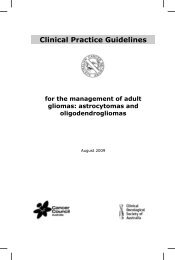Clinical Practice Guidelines for the management of locally advanced ...
Clinical Practice Guidelines for the management of locally advanced ...
Clinical Practice Guidelines for the management of locally advanced ...
Create successful ePaper yourself
Turn your PDF publications into a flip-book with our unique Google optimized e-Paper software.
Evidence summary Level References<br />
In terms <strong>of</strong> overall survival <strong>the</strong>re are no data <strong>for</strong> or against using CAB<br />
in preference to medical or surgical castration alone as primary ADT<br />
<strong>for</strong> <strong>locally</strong> <strong>advanced</strong> prostate cancer.<br />
If primary ADT is to be used, <strong>the</strong> data would support medical or<br />
surgical castration.<br />
I,II 13-15<br />
II,III-1 1, 8-12<br />
The modest benefit seen with castration alone in <strong>the</strong> two modern-era studies 3, 5 suggests castration<br />
alone can be used as a primary ADT <strong>for</strong> men with <strong>locally</strong> <strong>advanced</strong> prostate cancer. The modest<br />
benefit from CAB in <strong>the</strong> combined M0 and M1 group 13 is at <strong>the</strong> cost <strong>of</strong> increased toxicity and may or<br />
may not translate to this patient population.<br />
Recommendation<br />
A recommendation cannot be made on <strong>the</strong> basis <strong>of</strong> <strong>the</strong> evidence currently available.<br />
Grade D<br />
Complications and cumulative treatment toxicity<br />
For men with non-metastatic prostate cancer, androgen deprivation has been shown to provide a<br />
survival benefit as an adjuvant to radiation <strong>the</strong>rapy <strong>for</strong> high-risk and in many studies <strong>for</strong> intermediaterisk<br />
prostate cancer and as an adjuvant to radical prostatectomy but only <strong>for</strong> lymph node positive fully<br />
resected disease. These treatments may last over two years, with <strong>the</strong> minimum duration <strong>for</strong> maximal<br />
survival benefit unclear. As a result, adverse events or unwanted effects have <strong>the</strong> potential to have a<br />
significant impact on quality <strong>of</strong> life. These men have relatively long life expectancies and thus <strong>the</strong><br />
potential longer-term side effects <strong>of</strong> <strong>the</strong>se <strong>the</strong>rapies are important. Observational studies have<br />
suggested that, with relatively long life expectancies, <strong>the</strong>re may be a higher risk <strong>of</strong> metabolic<br />
syndrome, sudden cardiac death, myocardial infarctions, diabetes mellitus and a higher rate <strong>of</strong><br />
fractures. 16, 17 The longer <strong>the</strong> duration <strong>of</strong> ADT with LHRH agonist <strong>the</strong>rapy or orchidectomy, <strong>the</strong><br />
greater <strong>the</strong> likelihood <strong>of</strong> <strong>the</strong> serious adverse effects <strong>of</strong> reduced bone mineral density and pathological<br />
fracture in particular. (See section 5.1.5 Quality <strong>of</strong> life <strong>for</strong> a fuller discussion).<br />
There are a large number <strong>of</strong> randomised controlled trials reporting ADT adverse events. However,<br />
many <strong>of</strong> <strong>the</strong>se trials are not applicable since medications employed, such as oral oestrogens,<br />
finasteride and cyproterone acetate, are not recommended as first-line drugs <strong>for</strong> prostate cancer, even<br />
<strong>for</strong> short periods to <strong>of</strong>fset <strong>the</strong> flare effect <strong>of</strong> LHRH agonists. This review focuses on <strong>the</strong> adverse<br />
events associated with <strong>the</strong> clinically relevant <strong>the</strong>rapies <strong>of</strong> castration (medical or surgical) and nonsteroidal<br />
anti-androgens <strong>for</strong> <strong>the</strong> treatment <strong>of</strong> non-metastatic prostate cancer.<br />
Five RCTs compared castration (surgical or medical) with no ADT 1, 3, 18-21 ; two compared long-term<br />
anti-androgen <strong>the</strong>rapy with no ADT 6, 22, 23 ; three compared castration with long-term anti-androgen<br />
<strong>the</strong>rapy 11, 24, 25 ; and three compared short-term CAB with no ADT. 26-30<br />
Limited data from four randomised trials failed to demonstrate an increase in cardiovascular mortality<br />
1, 3, 18, 19<br />
or myocardial infarction with orchidectomy or long-term LHRH agonist treatment.<br />
Bicalutamide (anti-androgen) was associated with a significantly increased likelihood <strong>of</strong> heart failure<br />
6, 22<br />
in one study (risk ratio = 1.96).<br />
The effects <strong>of</strong> castration on sexual function were not reported in <strong>the</strong>se studies, possibly because <strong>the</strong>y<br />
are so well accepted. Castration was associated with hot flushes and breast changes 18 and LHRH<br />
20, 21<br />
agonists were associated with cognitive impairment.<br />
19<br />
Locally <strong>advanced</strong> disease



